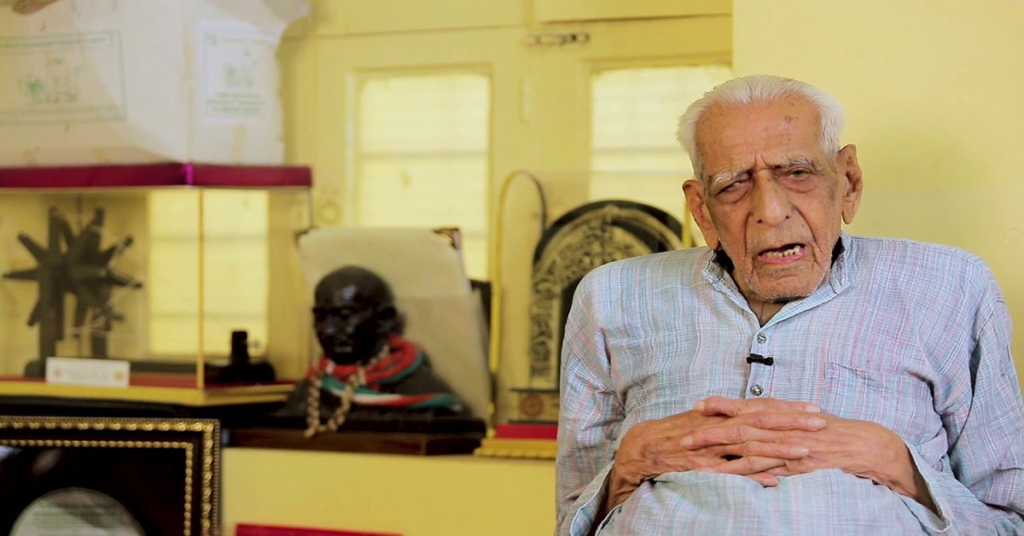
HS Doreswamy: The Man who won’t Give Up Human Rights Defender Profile
10, Apr 2018 | Mansi Mehta
Harohalli Srinivasaiah Doreswamy, life-long social activist, turns 100 today. Born on April 10, 1918, Doreswamy has credited his life motto–”A social worker should embrace voluntary poverty”–to Mahatma Gandhi’s My Early Life, which Doreswamy read as a teenager. Starting with India’s struggle for independence, Doreswamy has not only been witnessed, but has been an active part of several major activist movements over the last several decades.
Early life and freedom struggle
Born in Harohalli village in what was then the princely state of Mysore, Doreswamy lost his father at the young age of five, and was subsequently raised by his grandfather and his mother. An alumnus of Central College in Bengaluru, he completed his education in 1942, and started his career as a teacher of physics and mathematics at a local high school. Doreswamy was active in India’s freedom movement, initially using time bombs to destroy documents belonging to the British government. After being named as an associate by Ramchandra, a man who was arrested with time bombs, Doreswamy was placed in indefinite detention in Bangalore Central Jail, eventually spending a total of 14 months in prison.
In jail, he was with his freedom fighter compatriots, including his brother H. S. Seetharam, who went on to serve as the mayor of Bangalore/Bengaluru. He described jail as being “like university” to the BBC, saying he learnt Hindi and Tamil there, and also played volleyball. Following his release, Doreswamy decided not to “go back to throwing time bombs,” having absorbed Gandhi’s non-violent philosophy. He has told YourStory that he was also involved with persuading mill workers and owners to shut down mills that produced parachute cloth, to disrupt Britain’s World War effort.
Post-Independence
In 1950, Doreswamy married his now wife, Lalithamma, having met her at a friend’s house where they played dice. “I lost three matches to her and also my heart,” he told the BBC. After India obtained independence, Doreswamy was active in the Congress Party, but did not want to hold political office. Instead, he he decided to continue with social work, working with the homeless, poor farmers, workers, and slum dwellers. After being freed from jail, Doreswamy operated Sahitya Mandira, a publishing depot, then moved to Mysore to take on Pauravani, a struggling newspaper, to fulfil a friend’s last wish.
In the 1950s, he joined the Bhoodan Movement, which was spearheaded by freedom fighter and human rights activist Vinoba Bhave. The Bhoodan Movement was aimed at persuading wealthy landowners to surrender part of their land, which could be allocated to landless people so that they could live and grow food there. He was paid Rs. 100 every month.
In 1975, Doreswamy challenged then Prime Minister Indira Gandhi after she declared Emergency. In a letter, he railed, “You’re elected as a democrat, but you’re acting like a dictator. If you continue like this, I will go from house to house, village to village and tell people that you’re a dictator,” the BBC reported. He was subsequently arrested, spending four months in jail before he was cleared and freed, with the courts saying he had the right to criticise the prime minister.
A life-long activist
Doreswamy has been described as “deceptively frail-looking,” a seemingly accurate assessment, as his commitment to social activism seems not to have wavered at all, in spite of his age. In 2016, he travelled more than 500km from Bengaluru to Belagavi to stage a satyagraha at the Suvarna Vidhana Soudha, demanding land for landless people. In 2017, he was an active participant in the fight to save the lakes of Bengaluru. In September, he also fought against the encroachment of land in and around Bengaluru, calling on the local government to pass an ordinance to acquire encroached land. He told the Economic Times that he takes up only those problems for which solutions can be found; one such issue was the dumping of Bengaluru’s garbage in the nearby town of Mandur. An eventual protest yielded a written agreement from authorities that pledged to end the dumping and the removal of the garbage within three years.
Doreswamy told YourStory that he vividly remembers the night India achieved Independence, saying the celebrations continued all through the night. However, he has also struggled with disillusionment in the decades since, saying, “We fought for an independent India to eradicate poverty, to decentralise power and establish a Janata Sarkar (people’s government), but today the governments that rule have no true values. They help the rich get richer by encouraging corporate culture. Elections are driven by money power and caste.” He has lamented the persistence of poverty, and the splintering of society over caste and religion. “Gandhi ji when he said that he wants swaraj, his first aim was eradication of poverty. Nobody has found a permanent solution for eradication of poverty,” he told NDTV. However, this inspiring man, who himself chose to embrace ‘poverty’ so he could continue his work, has much to teach us.










